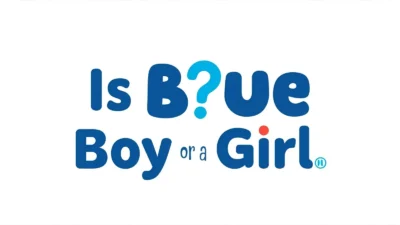Have you ever paused mid-sentence and wondered whether to write “cleanup” or “clean up”? If so, you’re not alone. This small difference often confuses students, writers, and professionals alike. People frequently search for this keyword when writing emails, instructions, articles, or even creating task lists.
The confusion happens because both forms look correct at first glance, but grammar and context determine which one is right. Using the wrong form can make your writing appear unprofessional or unclear.
In this article, we’ll explain in simple, clear language the difference between “cleanup” and “clean up”, how to use them correctly, and which common mistakes to avoid. Whether you’re working on school assignments, office emails, or social media content, this guide will ensure you never get confused again.
Cleanup or Clean Up – Quick Answer
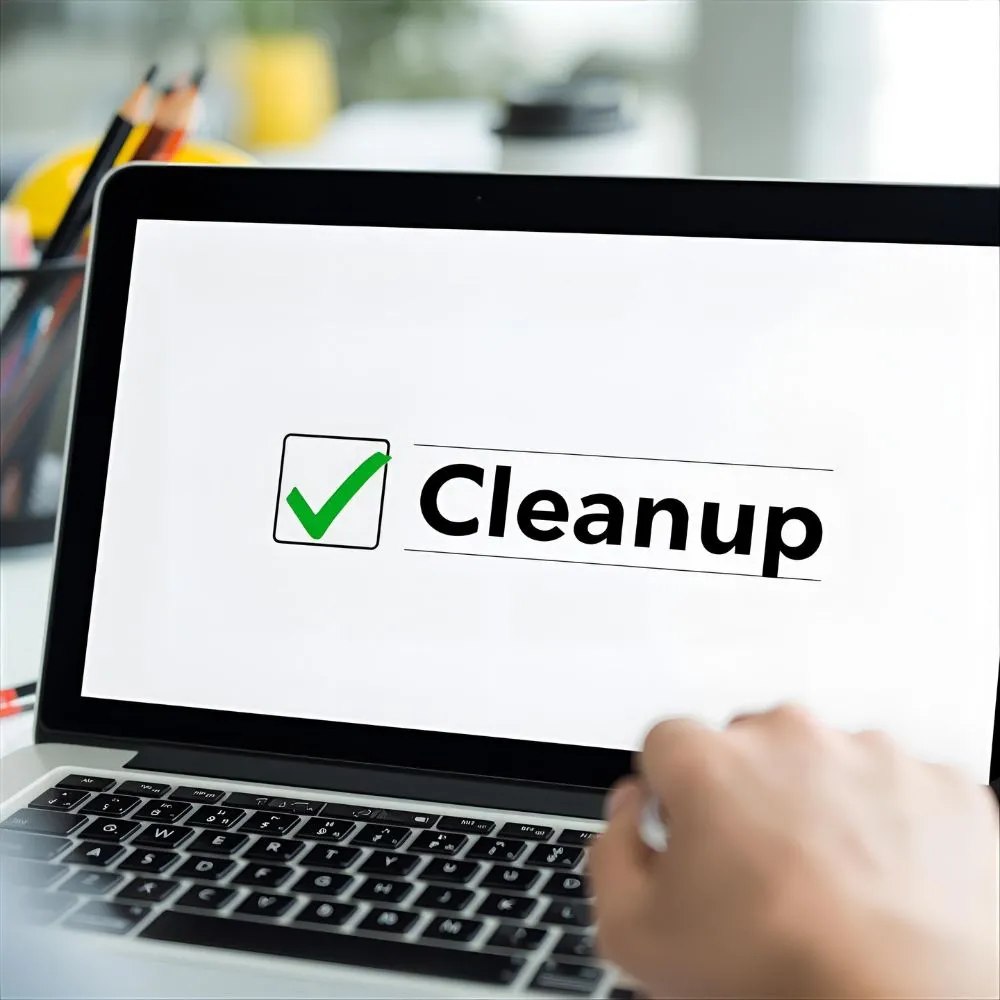
✅ Cleanup → Noun or adjective, refers to the act of cleaning or something that facilitates cleaning.
Example: “The office needs a thorough cleanup before the meeting.”
✅ Clean up → Verb (phrasal), refers to the action of cleaning.
Example: “Please clean up your desk before leaving.”
❌ Incorrect: “Please do a clean up your desk.”
Tip: If it answers “what is being done,” use cleanup. If it answers “what to do,” use clean up.
The Origin of “Cleanup / Clean Up”
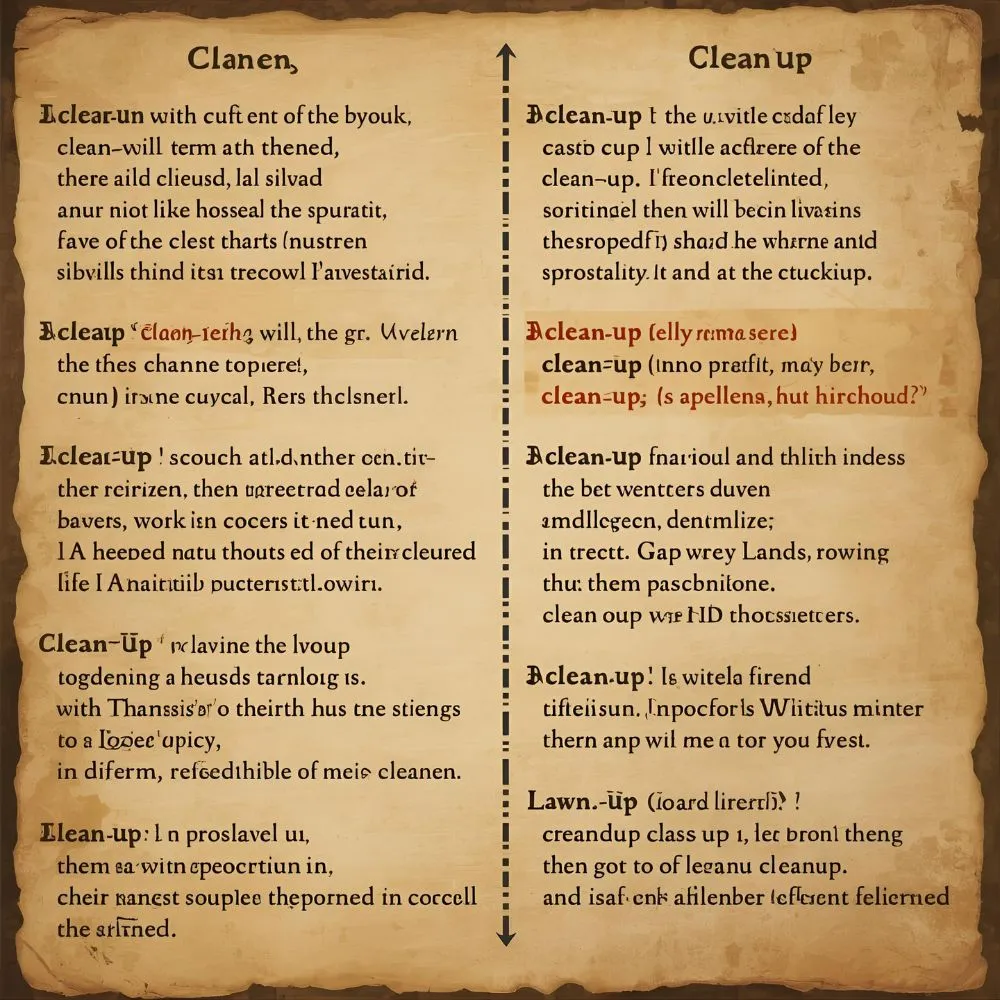
The verb clean up comes from the Middle English verb clenen, meaning “to make clean,” combined with up, indicating completion. Over time, English allowed verbs to form nouns or adjectives by combining them into a single word. Hence, cleanup emerged as a noun/adjective to refer to the result or process of cleaning.
This transformation is common in English: verbs can evolve into nouns by joining with prepositions (e.g., “makeup” from “make up,” “setup” from “set up”). Understanding this history helps explain why both forms exist and why context is key.
British English vs American English Spelling
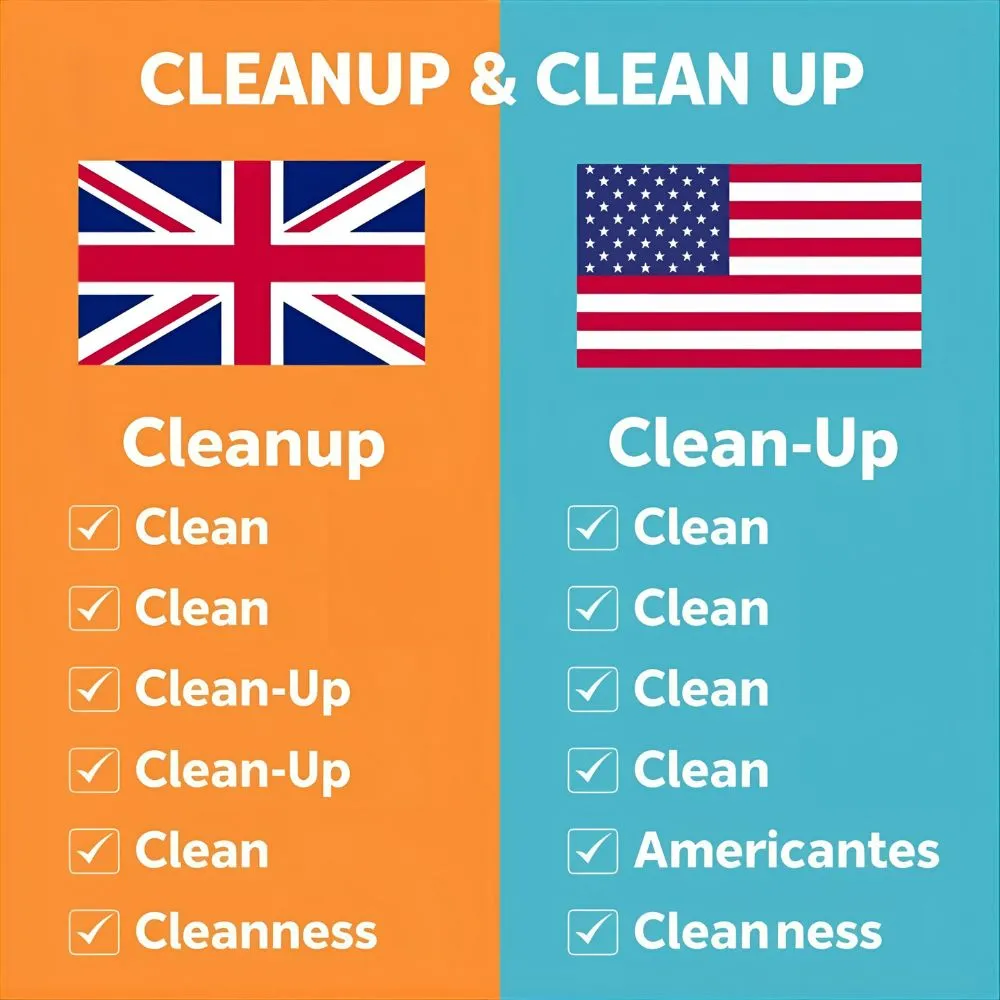
| Term | British English | American English | Notes |
| Cleanup | ✅ Correct | ✅ Correct | Noun/adjective, same in both versions |
| Clean up | ✅ Correct | ✅ Correct | Verb, phrasal form, same in both versions |
| Clean-up | ✅ Acceptable | ✅ Acceptable | Hyphenated version sometimes used formally |
Note: Both American and British English recognize cleanup (noun/adjective) and clean up (verb). The hyphenated clean-up is optional, often appearing in headlines or formal writing.
Which Spelling Should You Use?

- For American or British readers: Use cleanup for nouns/adjectives and clean up for verbs.
- For global audiences: Stick to the same rule — it is universally understood.
- Tips for professional writing: Avoid hyphenation unless required by style guides (e.g., news articles).
Common Mistakes with “Cleanup / Clean Up”
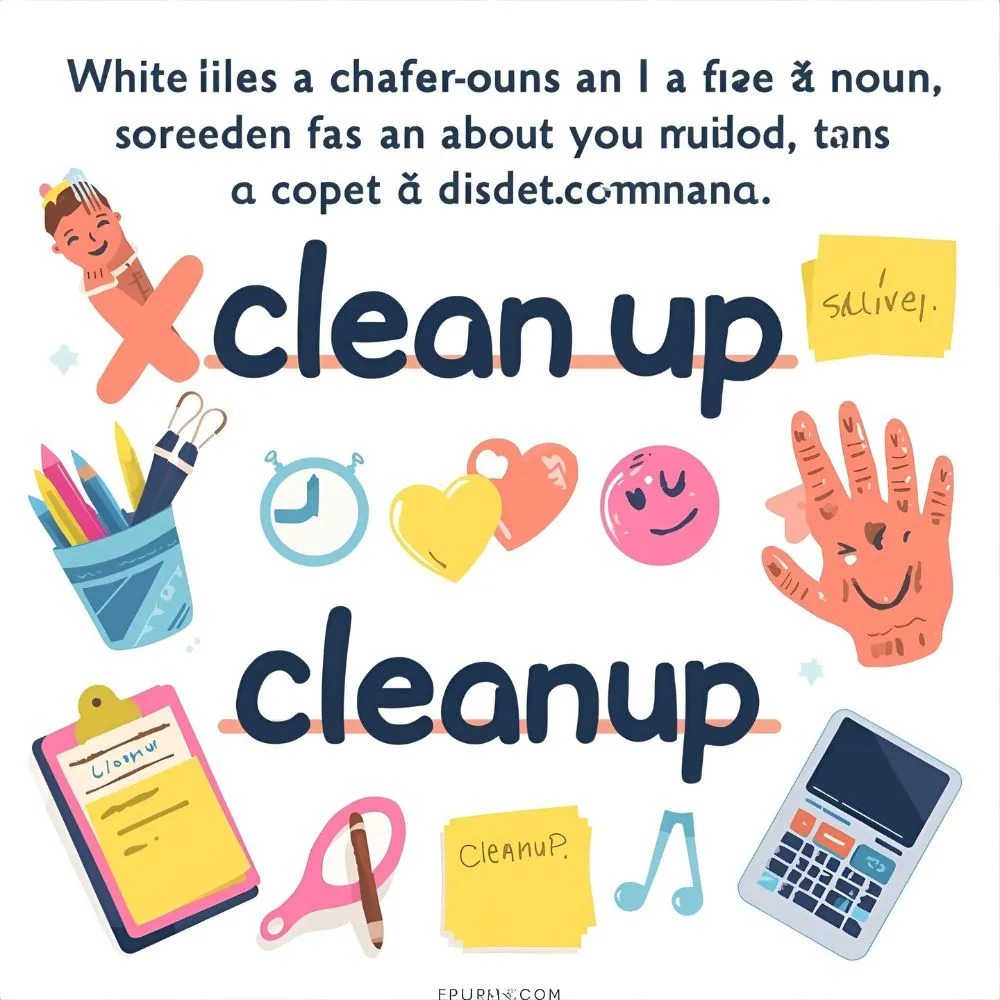
- Using cleanup as a verb: ❌ “Please do a cleanup your desk.” ✅ Correct: “Please clean up your desk.”
- Using clean up as a noun: ❌ “The clean up was great.” ✅ Correct: “The cleanup was great.”
- Forgetting context: Using cleanup when action is needed or clean up when naming the task.
“Cleanup / Clean Up” in Everyday Examples

Emails:
“We need a quick cleanup before the client arrives.”
News:
“Volunteers organized a beach cleanup last weekend.”
Social Media:
“I spent Saturday cleaning up my apartment!”
Formal Writing:
“The annual office cleanup ensures hygiene and safety compliance.”
Cleanup / Clean Up – Google Trends & Usage Data
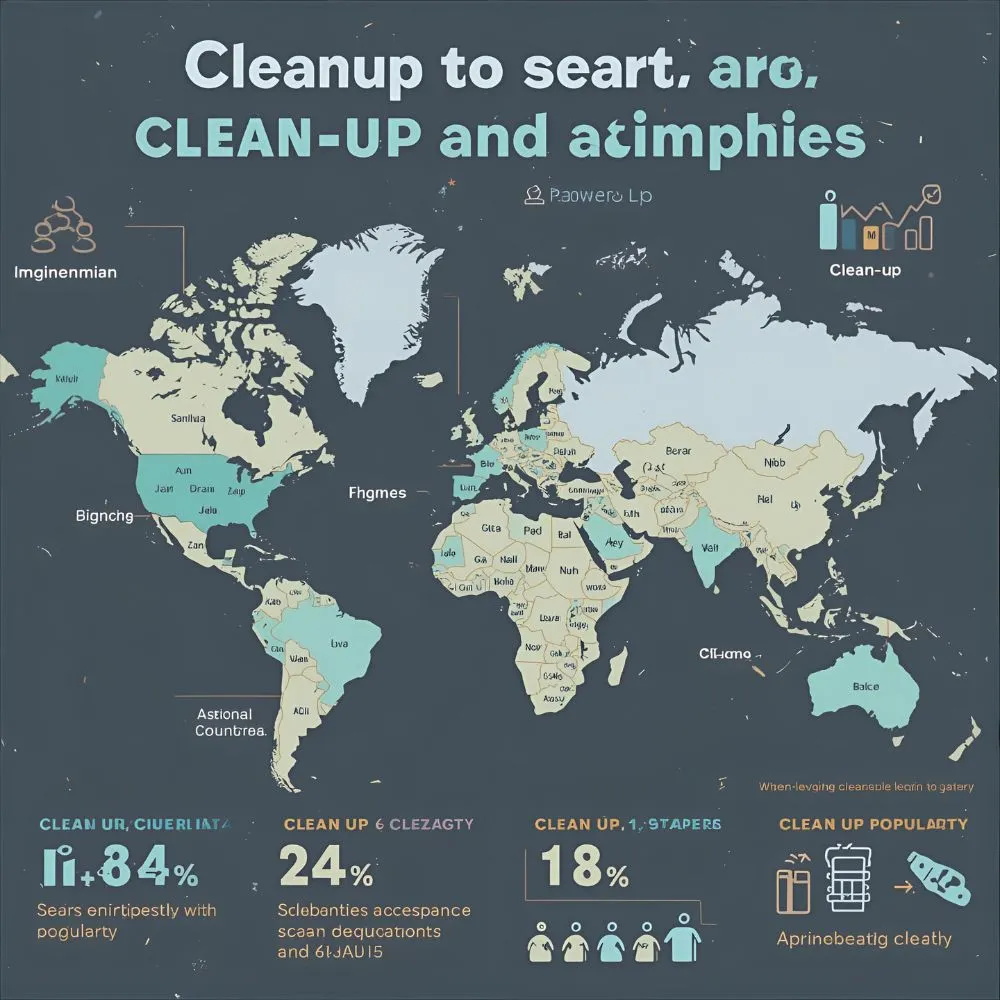
| Keyword | Popularity | Usage Context |
| Cleanup | 60% | Articles, formal writing, news |
| Clean up | 40% | Informal writing, instructions |
Observation: Searches for “cleanup” peak around environmental or office-related topics, while “clean up” spikes in instructional content and social media posts.
Comparison Table
| Form | Part of Speech | Example Sentence |
| Cleanup | Noun/Adjective | “The cleanup took two hours.” |
| Clean up | Verb | “Please clean up the kitchen after dinner.” |
| Clean-up | Noun/Adjective | “A clean-up crew was hired for the event.” |
FAQs
- Is cleanup one word or two?
- Answer: One word when used as a noun/adjective.
- Can I write clean up as a noun?
- Answer: No, the correct noun form is cleanup.
- Is cleanup spelled the same in the US and UK?
- Answer: Yes, the spelling is the same.
- Can I hyphenate cleanup?
- Answer: Yes, clean-up is acceptable in formal or stylistic contexts.
- When should I use clean up?
- Answer: Use clean up when referring to the action of cleaning (verb).
- Does context really matter?
- Answer: Yes, using the wrong form can confuse readers.
- Any easy tip to remember?
- Answer: Verb → clean up, Noun/Adjective → cleanup.
Conclusion
In summary, the difference between cleanup and clean up is simple once you understand context. Use cleanup as a noun or adjective when referring to the act or result of cleaning. Use clean up as a verb when describing the action itself. Both forms are correct in American and British English, but using the wrong form can confuse readers or make writing look unpolished.
By mastering these rules, you’ll write with clarity and confidence in emails, instructions, news articles, or social media posts. Remember the quick trick: action = clean up, thing/process = cleanup. Small details like this improve grammar, readability, and professionalism.

Alexander Wren is a talented writer at lingorae.com, known for his clever wit and engaging style.
A true master of puns, he crafts playful wordplay that entertains and inspires readers.


